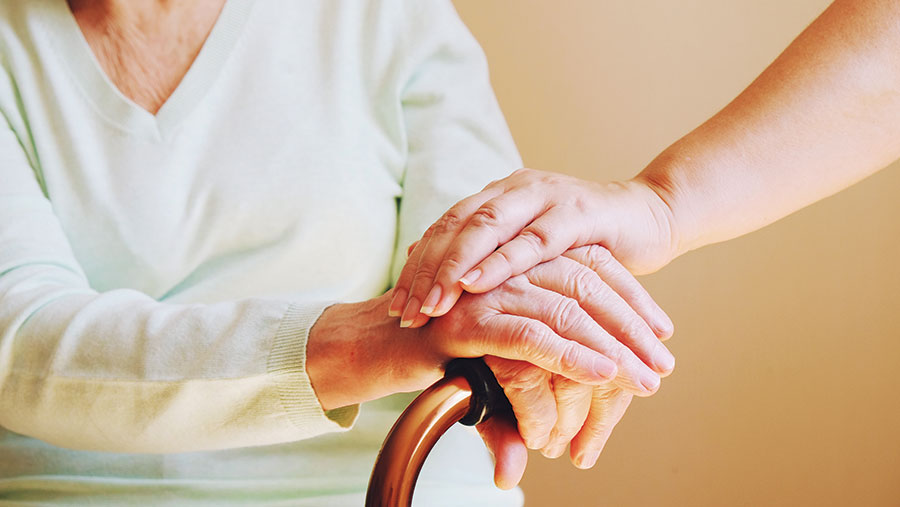Business Clinic: Handling partnership shares and care home fees
 © evrymmnt/Shutterstock
© evrymmnt/Shutterstock Whether you have a legal, tax, insurance, management or land issue, Farmers Weekly’s Business Clinic experts can help. Jermaine Smith, an associate with Thrings, advises on tricky partnership capacity issues and entitlement to help with care home fees.
Q. My husband lives on our family farm with his father and mother, in a partnership of father (50% share), mother (25%) and grandmother (25%).
His grandmother has had to go into a local nursing home due to loss of mental capacity, severe dementia and a high risk of falls. Staying in her purpose-built granny annexe on farm was not possible.
She is a temporary resident in a nursing home – not receiving medical care, but more for residential purposes. She doesn’t fit the criteria for NHS-funded nursing care.
We cannot find the answer as to whether the family farm must pay for her care in the nursing home – the farming finances are tight.
A: Under the Care Act 2014, the local authority is under a duty to assess both the care an individual requires and their financial resources for funding that care. It will then decide what that capital contribution towards their care should be.
Generally speaking, in England, an individual who owns assets and savings over £23,250 will be required to pay for their care. If an individual has assets of over £14,250 but less than £23,250 their contribution will be means-tested and they may have to partially fund their care.
Individuals with assets less than £14,250 will only contribute what they can afford from their income. The rules vary for those requiring care in Wales.
See also: Have I missed out on employment benefits?
Some assets can be classified as “disregarded capital” in the local authority assessment, meaning the assets will not be included in the assessment when calculating how the care should be paid for.
A share in a farming partnership is not classified as disregarded capital and would be brought into account in the local authority assessment.
On the facts presented, the share in the farming partnership would therefore be included in your grandmother’s case. If her assets exceed £23,250 (after being assessed) she will be required to pay for her care.
Q. Is there a way for us to take her out of the partnership, as she doesn’t have the mental capacity to make decisions? Would this have had to take place some years ago, or could it be done from now?
A: It is not clear whether the partnership has a formal agreement in place. Modern, well-drafted partnership agreements should include provision for loss of capacity of a partner.
This could then allow the remaining partners to give notice (or be deemed to give notice) to the partner who has lost capacity. Making use of such provisions allows the remaining partners to act without needing to obtain a court order.
If there is no partnership agreement or suitable provision regarding loss of capacity, your grandmother could be retired following an application to the court for an appropriate order. There will, of course, be costs associated with the application, in addition to court fees, should you decide to instruct a solicitor.
Q. Is there a way to restructure the partnership if all parties are happy to do this? My husband’s father has power of attorney for all of my grandmother’s affairs.
The retirement of a partner, whether under the partnership agreement or by court order, will not necessarily transfer the retiring partner’s capital to the partnership (in other words, the partnership capital will not automatically be restructured).
As your husband’s grandmother has lost capacity, she is unable to make significant gifts herself, including transferring her partnership capital.
A power of attorney, like the one the grandfather holds for the grandmother, confers only a very limited authority to make gifts on someone else’s behalf (for example, birthday and Christmas presents; charitable donations they were already in the habit of making).
It would not give authority to make significant transfers of partnership capital and any proposed transfers would require approval from the Court of Protection.
Whether an application to the Court of Protection would be successful will depend on your grandmother’s circumstances and all the relevant factors.
Even if the application to restructure the partnership was successful, the NHS (or local authority) may still set aside the gift, however it is made, under the deprivation of assets rules – whereby the care fees are calculated as if the assets were still owned.
The Charging for Residential Accommodation Guide (Crag), published by the Department of Health and Social Care, offers useful guidance on how business assets should be treated by the local authority in their assessment.
It states that while the share in the partnership (which is a business asset) does not fall into the category of disregarded capital, it can be treated as such for a “reasonable” period of time.
This is on the basis that your grandmother should be allowed a reasonable period in which to sell or otherwise realise the partnership share.
Whether that is practical will depend on the remaining partners’ ability to realise sufficient funds to purchase your grandmother’s share of the partnership.
Do you have a question for the panel?
Outline your legal, tax, finance, insurance or farm management question in no more than 350 words and Farmers Weekly will put it to a member of the panel. Please give as much information as possible.
Send your enquiry to Business Clinic, Farmers Weekly, RBI, Quadrant House, The Quadrant, Sutton, Surrey SM2 5AS.
You can also email your question to fwbusinessclinic@rbi.co.uk.

